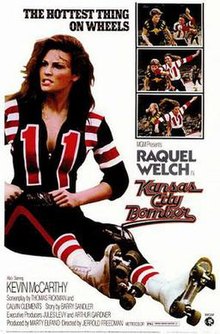Kansas City Bomber
| Kansas City Bomber | |
|---|---|

Promotional film poster
|
|
| Directed by | Jerrold Freedman |
| Produced by | Martin Elfand executive Arthur Gardner Jules V. Levy |
| Written by | Calvin Clements Sr. Thomas Rickman |
| Based on | story by Barry Sandler |
| Starring |
Raquel Welch Kevin McCarthy Helena Kallianiotes Jodie Foster |
| Music by | Don Ellis |
| Cinematography | Fred J. Koenekamp |
| Edited by | David Berlatsky |
|
Production
company |
Artists Entertainment Complex
Levy-Gardner-Laven Raquel Welch Inc |
| Distributed by | Metro-Goldwyn-Mayer |
|
Release date
|
August 2, 1972 |
|
Running time
|
99 minutes |
| Country | United States |
| Language | English |
Kansas City Bomber is a 1972 American drama film released by Metro-Goldwyn-Mayer, directed by Jerrold Freedman and starring Raquel Welch.
The film is an inside look at the world of Roller Games, then a popular league sport-entertainment, a more theatrical version of Roller Derby.
The story focuses on K.C. Carr (Welch) who has just left her former team in Kansas City, Missouri to start her life as a single mother over again in Portland, Oregon with a team called the Portland Loggers. Loggers' owner Burt Henry (McCarthy) is clearly interested in her, and K.C. and Burt date. But Burt has a rather ruthless side to him: he trades away K.C.'s best friend on the team, and when he sees that star male skater "Horrible" Hank Hopkins is interested in her, he manipulates the audience into booing Hopkins, causing him to go crazy and lose his job. Henry's endgame is to set up a match race between K.C. and her teammate and rival Jackie Burdette (Kallianiotes), with K.C. deliberately losing so that she can join Henry at a new team he's setting up in Chicago. But K.C. doesn't trust Henry anymore (or his promises to let her bring her daughter along) and wins the match race.
The film was written by Barry Sandler as a UCLA MA Thesis, with Welch in mind for the lead. "Raquel was a huge star at the time--kind like the pop culture goddess," recalled Sandler. "I just thought it would be great to see her as a roller derby queen; it seemed like a perfect meshing of pop culture with that role."
Although Sandler and Welch shared the same agent, ICM, he was a very new screenwriter and was unsure if the script would actually get read. He delivered a copy personally to the house Welch then shared with her husband and manager, Patrick Curtis. Curtis bought the script in March 1971 for their production company, Curtwel Productions. "She was a huge star at the time, and that meant if she wanted to do it, the movie would get made," said Sandler.
"I believe that he had me in mind when he wrote it," said Welch. "The girl is more than a little bitchy."
Sandler says the original script was very different to what the movie became:
[It was] a dark, gritty, character piece, more in the vein of Requiem for a Heavyweight. It’s about this young woman from Kansas City who goes out to Hollywood dreaming of fame and fortune, making it in the movies, and she’s really not good enough to do so, but she’s desperate to make her name and to get attention. She struggles and struggles, and never makes it, and then one day, she meets this kind of beat up, bruised up, burnt-out ex roller derby queen who kind of takes her under her wing and coaches her, and tries to get her involved in the roller derby. It sort of shows her becoming a roller derby star, and the irony is that she makes it in the roller derby, but as a black-trophy...as a bad girl who gets hissed at, beat up, and spit on every week. The irony is that she is able to find the stardom she desperately yearned for, but not as a movie star--as a star on the roller derby track getting booed at and spit at every week. And so it’s kind of dark, and much grittier and different, kind of almost along the lines of Midnight Cowboy.
...
Wikipedia
